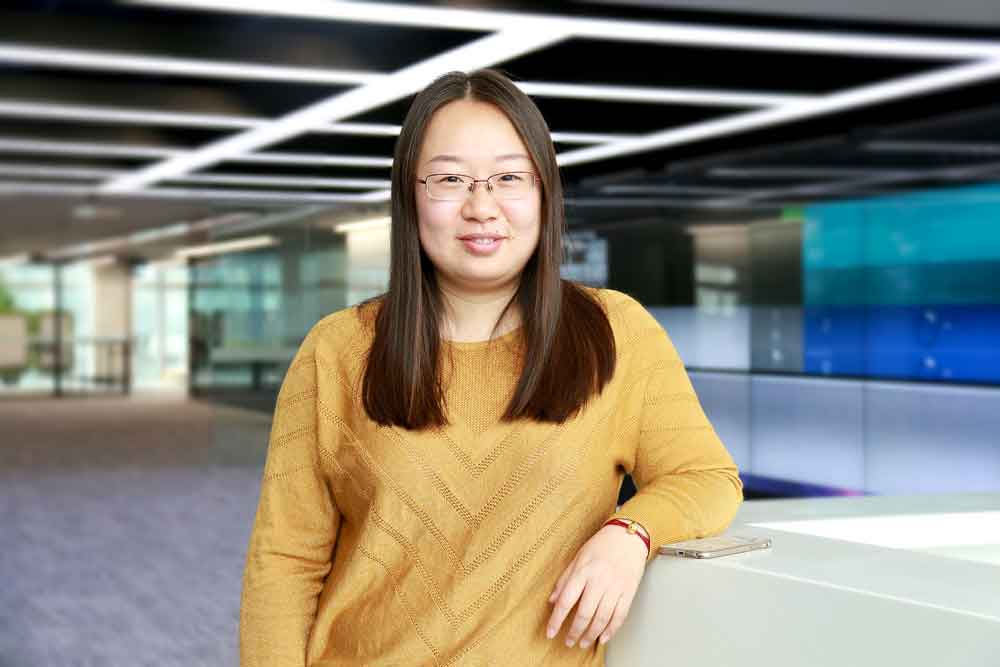'Leaning in' to break gender stereotypes in tech
By Guan Xiaomeng | chinadaily.com.cn | Updated: 2018-04-03 14:41
For Peng Shuang, the fruit of her work is more like a child she has been bringing up since its birth. She teaches the "child" to talk, learn, think and do everything she would expect from a real human child.

But this "child" is different — it is an artificial intelligence called Xiaoice, developed by Microsoft in 2014. Peng has been on the team from the very beginning.
In less than four years, Microsoft’s Xiaoice has interacted with more than 100 million users, grown up to a fifth generation and become an EQ-oriented AI system based on emotion computing framework.
From 2015 to 2017, Xiaoice was introduced to Japan, the US, India and Indonesia with different names and characters catering to local cultures. During this process, Peng worked as Principal rogram Manager Lead to determine what Xiaoice needs to learn to serve human beings.
Besides being an elite product on many social networks and a friend to hundreds of millions of users, Microsoft Xiaoice has also entered the field of Internet of Things (IoT). For example, it has been adopted as an AI system in the Xiaomi smart home platform, and entered into hardware devices.
"My job is to learn how to bring the cutting-edge AI technology to users' daily lives and make their lives happier," Peng said. "In this job, I think women have unique advantages, because females are more affinitive and able to read other's personalities. It turns out more and more women have been playing a crucial role in advancing science and technology. In the field of STEM (science, technology, engineering and mathematics), women are not only providing different points of view, but also leveraging natural differences to excel in communication and cooperation.”
A automation graduate of Tsinghua University, Peng was one of a minority commonly regarded as "science and technology girls" on campus, as fewer female students chose these majors because of a perceived inferiority compared to male classmates.
"That is not the case in the workforce," Peng said. "In a team, we need people with different education backgrounds and specialties."
Peng leads dozens of people in striving to delight users and make positive impacts. To achieve this, her team is always gaining insights about users, bridging users and partnering with other teams, such as engineering and operations.
"Unlike a 'science and technology class' at school, we have more girls in a work team because we do need what girls specialize in," Peng said.
The position of a program manager like Peng in Microsoft has even more representation: nearly half are women.
"The job is to deal with users, and women know more about 'user sympathy'. Of course, male employees in the IT industry are the majority. In Microsoft, we have a 'Diverse and Inclusive' culture, which creates an equal environment for development, and shows respect and care for women employees," Peng said.
"We female staff can get support through the mentor program, career development counseling, rotation learning and so on, so we can unlock our potential and showcase our talent. At the same time, we also have diverse projects, like Hack for Her, Ada Workshop, Codess and Global Women Conference, which are designed for women at different ages to learn and develop in STEM."
For Peng, the choice of major at one's school does not mean a choice for life. "Here in Microsoft, we even have archaeology and psychology majors," she said, believing other doors may open in one's career beyond one's major. "Just choose what you like, and pursuits of that will become natural."
When it comes to computer science, women are far from inferior. Ada Lovelace (1815-1852), an English mathematician and writer, is regarded as the first to recognize the full potential of a "computing machine" and the first computer programmer.
Professor Jeannette M. Wing, a former Corporate Vice President of Microsoft, was the first to promote computational thinking, expressing algorithmic problem-solving and abstraction techniques used by computer scientists and how they might be applied in other disciplines.
To her female colleagues, Peng suggests they grab any opportunity to give themselves more representation. "Usually, if it's between a male and female applicant with equal qualifications, the woman may choose to concede," she said.
That is because, as Facebook COO Sheryl Sandberg said in her book Lean In, women tend to undervalue their real ability compared to men. "The boss may choose the one who presents himself (or herself) well on the condition of less deeper understanding of the applicants at first sight," Peng said.
As overcoming this self-doubt is an important step for Microsoft's cultural progress, the innovative thinking mode "Growth Mindset" pioneered by Microsoft CEO Satya Nadella is aiming to encourage employees to know their own advantages and boldly use a "Growth Mindset" to explore STEM fields and keep moving forward.
Just choose your favorite and "lean in" to the workforce, Peng said.
Contact the writer at guanxm@chinadaily.com.cn
























